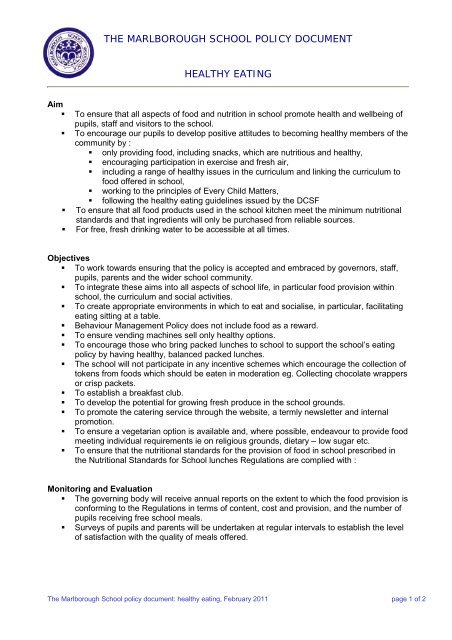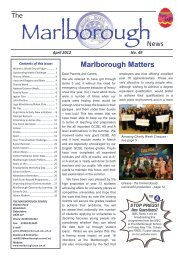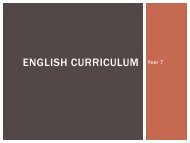Healthy eating - The Marlborough School
Healthy eating - The Marlborough School
Healthy eating - The Marlborough School
You also want an ePaper? Increase the reach of your titles
YUMPU automatically turns print PDFs into web optimized ePapers that Google loves.
THE MARLBOROUGH SCHOOL POLICY DOCUMENT<br />
HEALTHY EATING<br />
Aim<br />
• To ensure that all aspects of food and nutrition in school promote health and wellbeing of<br />
pupils, staff and visitors to the school.<br />
• To encourage our pupils to develop positive attitudes to becoming healthy members of the<br />
community by :<br />
• only providing food, including snacks, which are nutritious and healthy,<br />
• encouraging participation in exercise and fresh air,<br />
• including a range of healthy issues in the curriculum and linking the curriculum to<br />
food offered in school,<br />
• working to the principles of Every Child Matters,<br />
• following the healthy <strong>eating</strong> guidelines issued by the DCSF<br />
• To ensure that all food products used in the school kitchen meet the minimum nutritional<br />
standards and that ingredients will only be purchased from reliable sources.<br />
• For free, fresh drinking water to be accessible at all times.<br />
Objectives<br />
• To work towards ensuring that the policy is accepted and embraced by governors, staff,<br />
pupils, parents and the wider school community.<br />
• To integrate these aims into all aspects of school life, in particular food provision within<br />
school, the curriculum and social activities.<br />
• To create appropriate environments in which to eat and socialise, in particular, facilitating<br />
<strong>eating</strong> sitting at a table.<br />
• Behaviour Management Policy does not include food as a reward.<br />
• To ensure vending machines sell only healthy options.<br />
• To encourage those who bring packed lunches to school to support the school’s <strong>eating</strong><br />
policy by having healthy, balanced packed lunches.<br />
• <strong>The</strong> school will not participate in any incentive schemes which encourage the collection of<br />
tokens from foods which should be eaten in moderation eg. Collecting chocolate wrappers<br />
or crisp packets.<br />
• To establish a breakfast club.<br />
• To develop the potential for growing fresh produce in the school grounds.<br />
• To promote the catering service through the website, a termly newsletter and internal<br />
promotion.<br />
• To ensure a vegetarian option is available and, where possible, endeavour to provide food<br />
meeting individual requirements ie on religious grounds, dietary – low sugar etc.<br />
• To ensure that the nutritional standards for the provision of food in school prescribed in<br />
the Nutritional Standards for <strong>School</strong> lunches Regulations are complied with :<br />
Monitoring and Evaluation<br />
• <strong>The</strong> governing body will receive annual reports on the extent to which the food provision is<br />
conforming to the Regulations in terms of content, cost and provision, and the number of<br />
pupils receiving free school meals.<br />
• Surveys of pupils and parents will be undertaken at regular intervals to establish the level<br />
of satisfaction with the quality of meals offered.<br />
<strong>The</strong> <strong>Marlborough</strong> <strong>School</strong> policy document: healthy <strong>eating</strong>, February 2011 page 1 of 2
SUMMARY OF NUTRITIONAL STANDARDS FOR SCHOOL LUNCHES<br />
More Fruit and<br />
Vegetables<br />
More Oily Fish<br />
Bread<br />
Drinking Water<br />
Healthier Drinks<br />
Not less than two servings per day per child; at least one should be<br />
vegetables or salad and at least one should be fruit.<br />
Oily fish such as mackerel or salmon should be served at least once<br />
every three weeks.<br />
Bread should be available at lunch every day.<br />
Free, fresh drinking water should be available at all times.<br />
<strong>The</strong> only drinks served should be water, pure fruit juices, milk, yoghurt<br />
and milk drinks with less than 5% added sugar, smoothies, low calorie hot<br />
chocolate, coffee and tea. (NB Artificial sweeteners could be used only in<br />
yoghurt and milk drinks, or combinations based on yoghurt or milk.)<br />
This means sweetened fizzy drinks which have little nutritional value are<br />
no longer allowed.<br />
<strong>The</strong>se foods are now restricted or no longer allowed<br />
NO Confectionery<br />
NO Savoury Snacks<br />
NO Salt<br />
Condiments –<br />
Restricted<br />
Deep-Fried Foods –<br />
Restricted<br />
Manufactured Meat<br />
Products –<br />
Restricted<br />
Confectionery such as chocolate bars, chocolate-coated biscuits and<br />
sweets should not be available for lunch.<br />
Savoury snacks such as crisps should not be available for lunch. Only<br />
nuts and seeds with no added salt, sugar or fat are allowed.<br />
Salt should not be available at lunch.<br />
Condiments, such as ketchup and mayonnaise, should only be available<br />
in sachets.<br />
Meals should not contain more than two deep-fried foods, such as chips<br />
and batter-coated products, in a single week.<br />
<strong>The</strong>se products, such as chicken nuggets, burgers and sausage rolls,<br />
may only be served occasionally, and only providing they meet standards<br />
for minimum meat content and do not contain any prohibited offal.<br />
Date of Policy: 2 nd February 2011<br />
Date of Review of Policy: February 2014<br />
Reviewed by the Governors’ Pupils and Personnel Sub Committee<br />
Signed by Chair : ……………………………………………..<br />
Date : ………………………………………………………….<br />
<strong>The</strong> <strong>Marlborough</strong> <strong>School</strong> policy document: healthy <strong>eating</strong>, February 2011 page 2 of 2









![Recommended Good Reads [PDF]](https://img.yumpu.com/11815887/1/190x245/recommended-good-reads-pdf.jpg?quality=85)